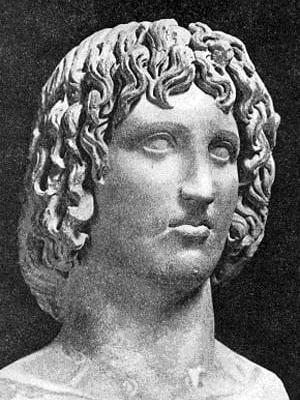Virgil (Publius Vergilius Maro) (70 BCE – 19 BCE)
Virgil was a prolific Roman poet, best remembered for his epic, Aeneid. He Was to Rome what Homer was to Greece. The national epic of ancient Rome, Aeneid follows the fortunes of the Trojan refugee, Aeneas. It is the mythical story of the founding of Rome, a story that has given us our idea of that event and the history of Rome before the modern period. It has been, and is still, used by writers as the basis of Western history and values The long lasting impact of the Aeneid, is mainly because of the coincidence of events in political and literary history at the time of its writing in the 20s BCE when the first Roman emperor, Augustus, established his regime after the defeat of Antony at the Battle of Actium in 31 BCE. Virgil tells the story of the Trojan hero Aeneas, legendary ancestor of the Romans and, more particularly, of the family of Julius Caesar, of which Augustus was a member.
Aeneas flees from his home city Troy, sacked by the Greeks at the end of the Trojan War, to Italy, where founds a new city, to be followed in time by the foundation of Rome. The Aeneid is an epic about origins and roots, a charter myth both for the city of Rome and for the foundation of the Augustan dynasty, the Roman Empire that would survive until the sack of Rome in 410 CE, to be revived in the thousand-year long Holy Roman Empire which lasted from the coronation of Charlemagne in 800 CE until its abolition by Napoleon. The Augustan regime was also a model for the other empires of the future. The Aeneid also presents a model for later epics, in modern European languages, celebrating kings and emperors, or tracing legendary and historical foundations. Tennyson’s Idylls of the King, drawing on the British legend of King Arthur, is a Virgilian poem, both celebrating the British empire and drawing attention to its flaws.

Portrait of Virgil
T. S. Eliot called the Aeneid ‘the classic of all Europe’, and suggested that ‘Virgil acquires the centrality of the unique classic; he is at the centre of European civilization, in a position which no other poet can share or usurp.’ Seamus Heaney had a profound relationship with the poetry of Virgil. In his last collection of poems, Human Chain (2010), the sequence ‘Route 110’ is an adaptation of Aeneas’ journey through the Underworld, into Heaney’s own journey.
Read biographies of all of the 30 greatest writers ever >>



